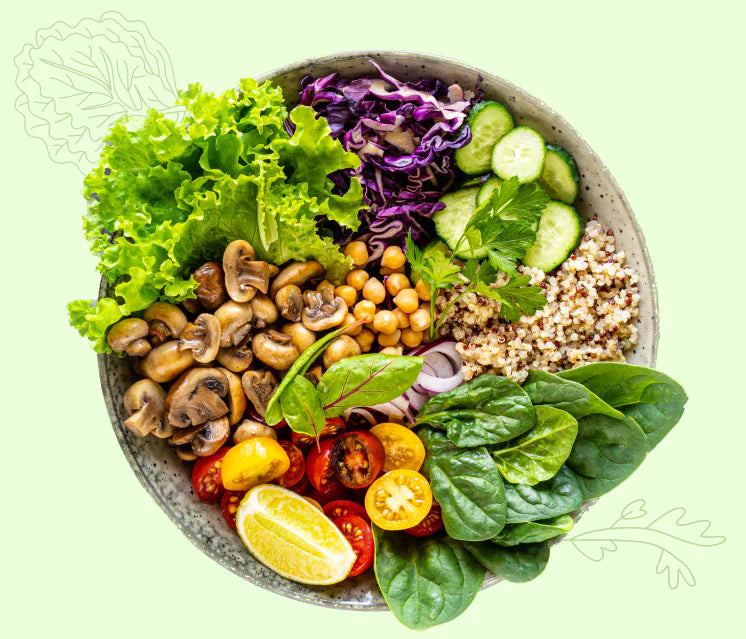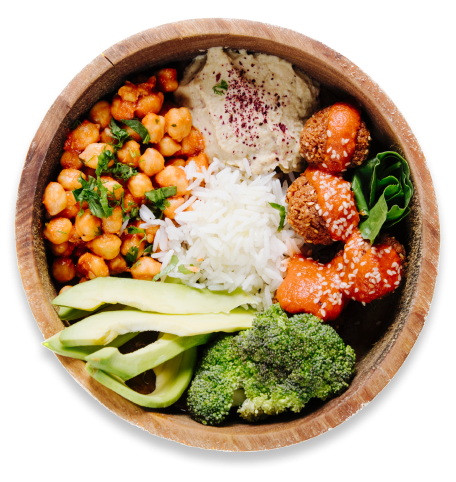Call Us 123456789
Free delivery on order over $200
Vegan for Athletes: How Plant-Based Nutrition Fuels Performance
Buy meal plan
In recent years, the rise of plant-based diets has captivated not only health-conscious individuals but also athletes looking to optimize their performance. Veganism, once considered a niche lifestyle, is now seen as a powerhouse of nutrition, fueling elite athletes across a variety of sports. With Dubai’s vibrant fitness scene, more athletes are turning to vegan meal delivery services like Plant Power to meet their nutritional needs while maintaining peak performance. Whether you're a dedicated vegan or considering the switch, the benefits of a plant-based diet for athletes go far beyond just fueling workouts.
Let’s explore how a whole-food, plant-based (WFPB) diet supports athletic performance and why choosing our vegan meal prep and delivery service can be a game-changer for fitness enthusiasts who value sustainability, convenience, and health.
Let’s explore how a whole-food, plant-based (WFPB) diet supports athletic performance and why choosing our vegan meal prep and delivery service can be a game-changer for fitness enthusiasts who value sustainability, convenience, and health.
Why Athletes are Embracing Plant-Based Nutrition
The trend of athletes adopting vegetarian diets is growing rapidly due to the vast health benefits they offer. A well-planned plant-based diet, rich in whole, nutrient-dense foods, provides all the essential nutrients needed to fuel endurance, build muscle and promote recovery. Gone are the days when vegan diets were seen as insufficient for high-intensity athletes. Now, experts agree that a plant-based and vegetarian diet offers improved heart health, faster recovery, and sustained energy levels while supporting long-term public health and environmental goals.
Improved Endurance and Energy Levels: Carbohydrates are the primary fuel source for athletes, and fiber-rich, plant-based foods like grains, legumes, fruits and vegetables provide complex carbohydrates that are digested slowly for sustained energy. Athletes switching from an omnivorous diet or a flexitarian diet to a WFPB diet often feel lighter, more energized and capable of longer endurance. By replacing animal foods with healthy plant sources like sweet potatoes, brown rice, and whole wheat pasta, athletes can stabilize blood sugar, prevent energy crashes and promote long-lasting stamina. Additionally, a WFPB diet has been shown to lower risks of chronic diseases such as cardiovascular disease and kidney disease.
Faster Recovery with Anti-Inflammatory Foods: One of the greatest benefits of a plant-based diet is its anti-inflammatory properties. After intense workouts, muscles experience inflammation and oxidative stress. Plant foods, rich in antioxidants, vitamins and minerals, help reduce inflammation and speed up recovery. Ingredients like berries, green leafy vegetables, turmeric and healthy oils like olive oil are packed with nutrients that fight free radicals and promote muscle repair. Athletes on such diets also benefit from faster recovery, allowing for more frequent and intense training sessions, resulting in better overall performance.
Improved Endurance and Energy Levels: Carbohydrates are the primary fuel source for athletes, and fiber-rich, plant-based foods like grains, legumes, fruits and vegetables provide complex carbohydrates that are digested slowly for sustained energy. Athletes switching from an omnivorous diet or a flexitarian diet to a WFPB diet often feel lighter, more energized and capable of longer endurance. By replacing animal foods with healthy plant sources like sweet potatoes, brown rice, and whole wheat pasta, athletes can stabilize blood sugar, prevent energy crashes and promote long-lasting stamina. Additionally, a WFPB diet has been shown to lower risks of chronic diseases such as cardiovascular disease and kidney disease.
Faster Recovery with Anti-Inflammatory Foods: One of the greatest benefits of a plant-based diet is its anti-inflammatory properties. After intense workouts, muscles experience inflammation and oxidative stress. Plant foods, rich in antioxidants, vitamins and minerals, help reduce inflammation and speed up recovery. Ingredients like berries, green leafy vegetables, turmeric and healthy oils like olive oil are packed with nutrients that fight free radicals and promote muscle repair. Athletes on such diets also benefit from faster recovery, allowing for more frequent and intense training sessions, resulting in better overall performance.
Plant-Based Protein: Busting the Myths:
A common misconception about vegan diets is that it's challenging to get enough protein. However, there are plenty of plant sources that provide protein in amounts sufficient to support muscle growth and repair.
Complete Protein from Plants: While animal products like red meat and dairy foods are traditionally considered complete proteins, meaning they contain all nine essential amino acids, athletes can easily meet their protein needs from meatless sources. By combining foods like legumes and grains or opting for complete proteins such as quinoa, soy milk and buckwheat, athletes can consume the full spectrum of amino acids. We deliver meals packed with protein-rich options like tofu, tempeh and nut butters to ensure a balanced diet without relying on animal products.
The Benefits of Plant-Based Protein: Unlike protein from red meat and dairy products, which can be high in saturated fats and cholesterol, plant-based proteins are typically lower in unhealthy fats and come paired with fiber, healthy oils, essential vitamins and minerals. These factors make plant proteins easier to digest and help athletes maintain a lower body weight while building muscle. Furthermore, reducing animal foods in favor of plant proteins lowers cholesterol levels, high blood pressure and even the risk of certain cancers, such as breast cancer.
Nutrient Density and the Power of Whole Foods
Athletes require a nutrient-dense diet to sustain performance, and dietary patterns with a plant-based nutrition delivers just that. Whole foods are rich in vitamins, minerals and antioxidants that play a vital role in supporting overall health, preventing disease, and optimizing athletic performance.
Boosting Immunity with Plant Power: A rigorous training schedule can weaken the immune system, making athletes more vulnerable to illness. Nutrient-rich plant-based foods help boost immunity. For instance, foods high in vitamin C, such as citrus fruits and bell peppers, along with fortified foods like breakfast cereals, aid in immune defense. Our meals also include zinc-rich seeds and nutritional yeast, further enhancing the body’s ability to fight off illnesses, keeping athletes healthy and able to train without interruption.
Tailored Nutrition with Plant Power Dubai: One of the key advantages of choosing a service like Plant Power is the flexibility we offer. Athletes can select a customized meal plan tailored to meet specific dietary needs - whether it's bulking, cutting, weight loss or maintaining a healthy body weight. Our meals are not only delicious but packed with essential nutrients, vitamin D and dairy alternatives such as plant milks like soy milk, making it easy to align nutrition with performance goals.
Hydration and Electrolytes from Plants
Hydration is crucial for athletic performance, and replenishing electrolytes—such as potassium and magnesium—is equally important. Many plant-based foods are naturally rich in these electrolytes, helping to maintain muscle function, regulate blood pressure, and support post-workout recovery.
Hydrating with Whole Foods: We integrate hydrating, electrolyte-rich foods such as bananas, coconut water and spinach into our meals to ensure athletes stay hydrated and replenished after intense training sessions. These natural sources not only help prevent muscle cramps but also contribute to maintaining lower blood pressure and overall cardiovascular health.
Sustainability and Organic Choices
Opting for a healthy vegan diet not only enhances your well-being but also supports sustainability efforts. By opting for organic, dairy-free, and plant-based cooking from a reliable source, athletes contribute to reducing the environmental impact of food production, promoting a cleaner, more sustainable planet. Our commitment to delivering a wide variety of fresh, organic meals helps athletes make eco-conscious decisions while fueling their bodies with nutrient-packed, whole foods.
Conclusion: Fuel Your Fitness
For athletes juggling demanding training sessions and busy schedules, Plant Power offers the perfect solution: convenient, clean, and plant-based eating that doesn’t compromise on nutrition or flavor. With customizable meal plans based on experts' plant-based recipes, tailored to meet your fitness goals, every meal is designed to support performance, aid recovery and provide sustained energy for your toughest workouts. Whether you're a seasoned athlete or just beginning your fitness journey, our vegan meal prep service will help you stay on track with your nutrition while focusing on what truly matters—your performance. By choosing Plant Power, and our health care professionals, you’ll fuel your body with the best plant-based nutrition, optimizing energy levels, enhancing recovery and promoting long-term health in a sustainable, delicious way.
FAQs:
1. Can athletes get enough protein on a vegan diet?
Yes, athletes can get all the protein they need from plant-based sources like lentils, chickpeas, tofu, tempeh, and quinoa. Plant Power offers balanced meals packed with these protein-rich ingredients to meet an athlete's needs.
2. How does a plant-based diet improve recovery?
Plant-based foods are rich in antioxidants and anti-inflammatory compounds, which help reduce muscle inflammation and oxidative stress after workouts, leading to faster recovery.
3. What are some high-protein plant-based foods?
High-protein plant foods include lentils, chickpeas, black beans, tofu, tempeh, quinoa, and seitan. These foods offer the essential amino acids needed for muscle repair and growth.
4. Are vegan meals good for endurance athletes?
Absolutely! Plant-based meals provide complex carbohydrates, fiber and essential nutrients that support sustained energy levels, making them ideal for endurance athletes.
5. How can Plant Power help athletes meet their nutritional goals?
We offer customizable vegan meal plans tailored to each athlete’s specific nutritional needs, whether it’s for muscle building, cutting, or maintaining a healthy weight.
What are you waiting for?
It’s time to kickstart your health journey with nourishing and delicious meals to boost your energy and overall health!

Translation missing: en.general.search.loading